TESOL Reflective Writing: English Teacher Development - MA TESOL
VerifiedAdded on 2023/06/08
|38
|9215
|229
Report
AI Summary
This assignment presents a reflective account on developing as an English language teacher (ELT), focusing on effective teaching strategies, lesson planning, and classroom management. It details the developmental process of a teacher, emphasizing critical reflection through self-evaluation, peer observation, and learner feedback. The account includes experiences teaching English to 12th-grade students, highlighting the importance of lesson planning, understanding student behavior, and integrating technology. The lesson plan incorporates constructivism learning theory and outlines objectives, resources, and timed activities. Various teaching methodologies, including integrated technology, are considered to enhance student understanding. The assignment concludes with a reflection on teaching methodologies and their impact on student learning.
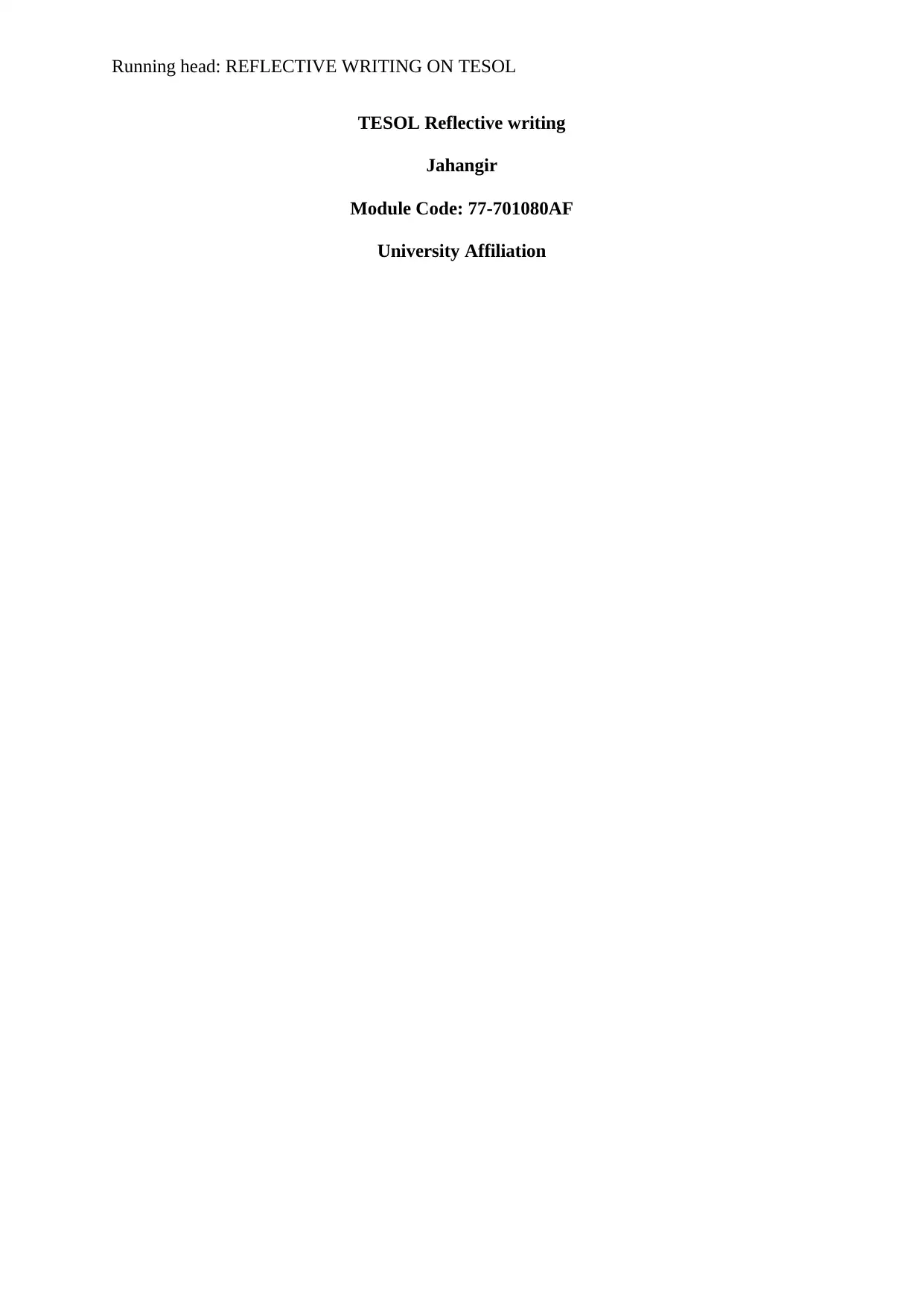
Running head: REFLECTIVE WRITING ON TESOL
TESOL Reflective writing
Jahangir
Module Code: 77-701080AF
University Affiliation
TESOL Reflective writing
Jahangir
Module Code: 77-701080AF
University Affiliation
Paraphrase This Document
Need a fresh take? Get an instant paraphrase of this document with our AI Paraphraser
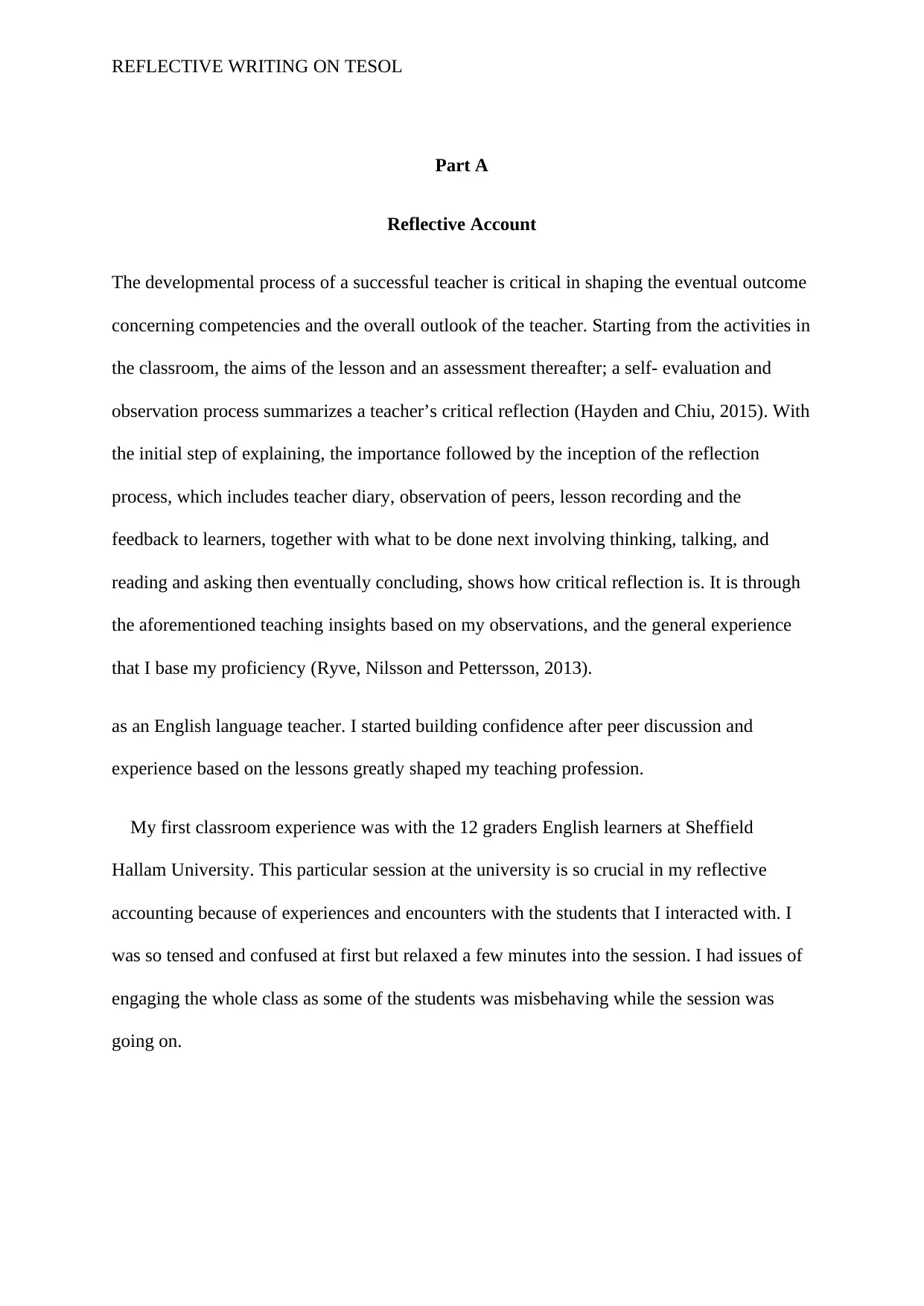
REFLECTIVE WRITING ON TESOL
Part A
Reflective Account
The developmental process of a successful teacher is critical in shaping the eventual outcome
concerning competencies and the overall outlook of the teacher. Starting from the activities in
the classroom, the aims of the lesson and an assessment thereafter; a self- evaluation and
observation process summarizes a teacher’s critical reflection (Hayden and Chiu, 2015). With
the initial step of explaining, the importance followed by the inception of the reflection
process, which includes teacher diary, observation of peers, lesson recording and the
feedback to learners, together with what to be done next involving thinking, talking, and
reading and asking then eventually concluding, shows how critical reflection is. It is through
the aforementioned teaching insights based on my observations, and the general experience
that I base my proficiency (Ryve, Nilsson and Pettersson, 2013).
as an English language teacher. I started building confidence after peer discussion and
experience based on the lessons greatly shaped my teaching profession.
My first classroom experience was with the 12 graders English learners at Sheffield
Hallam University. This particular session at the university is so crucial in my reflective
accounting because of experiences and encounters with the students that I interacted with. I
was so tensed and confused at first but relaxed a few minutes into the session. I had issues of
engaging the whole class as some of the students was misbehaving while the session was
going on.
Part A
Reflective Account
The developmental process of a successful teacher is critical in shaping the eventual outcome
concerning competencies and the overall outlook of the teacher. Starting from the activities in
the classroom, the aims of the lesson and an assessment thereafter; a self- evaluation and
observation process summarizes a teacher’s critical reflection (Hayden and Chiu, 2015). With
the initial step of explaining, the importance followed by the inception of the reflection
process, which includes teacher diary, observation of peers, lesson recording and the
feedback to learners, together with what to be done next involving thinking, talking, and
reading and asking then eventually concluding, shows how critical reflection is. It is through
the aforementioned teaching insights based on my observations, and the general experience
that I base my proficiency (Ryve, Nilsson and Pettersson, 2013).
as an English language teacher. I started building confidence after peer discussion and
experience based on the lessons greatly shaped my teaching profession.
My first classroom experience was with the 12 graders English learners at Sheffield
Hallam University. This particular session at the university is so crucial in my reflective
accounting because of experiences and encounters with the students that I interacted with. I
was so tensed and confused at first but relaxed a few minutes into the session. I had issues of
engaging the whole class as some of the students was misbehaving while the session was
going on.
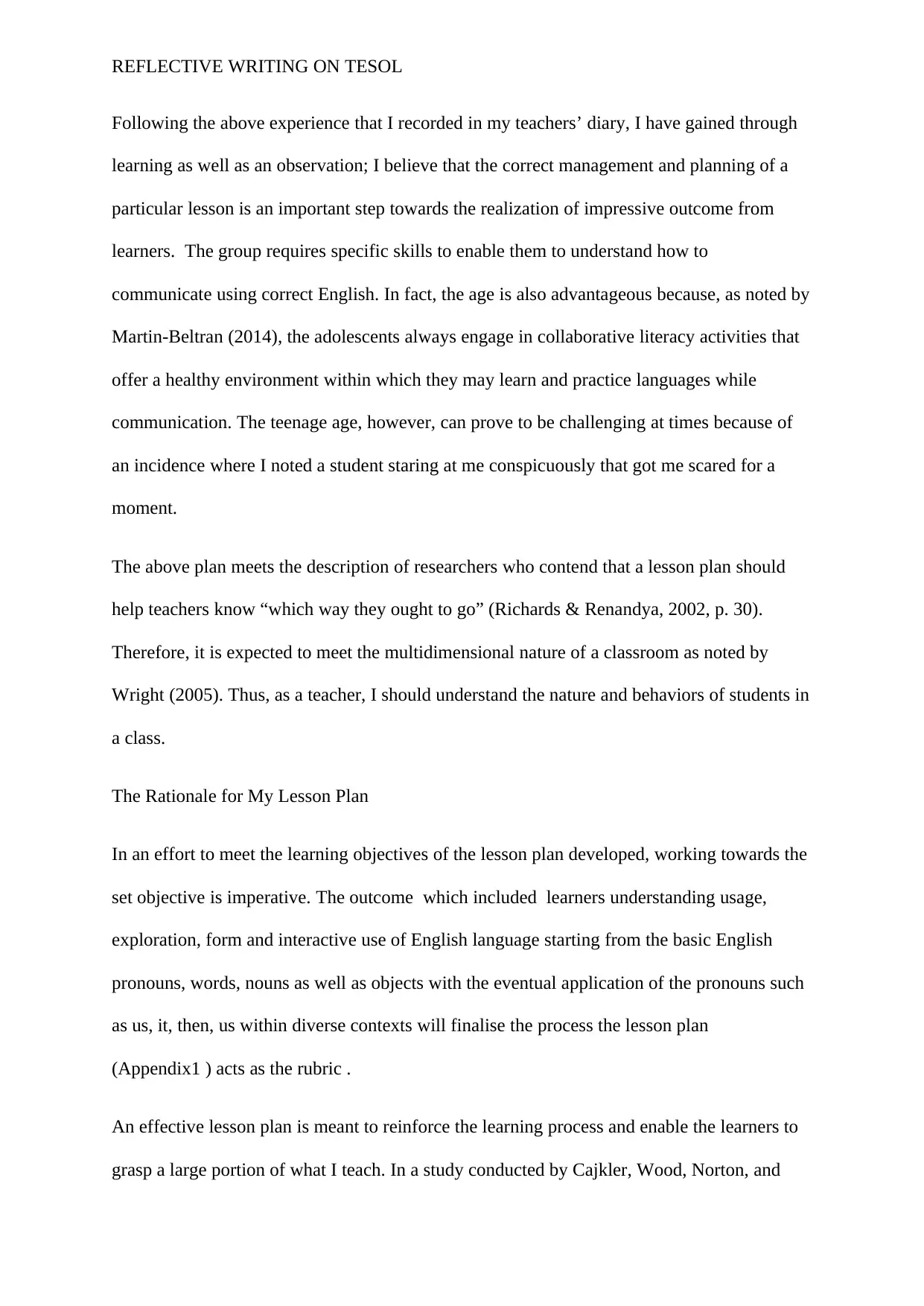
REFLECTIVE WRITING ON TESOL
Following the above experience that I recorded in my teachers’ diary, I have gained through
learning as well as an observation; I believe that the correct management and planning of a
particular lesson is an important step towards the realization of impressive outcome from
learners. The group requires specific skills to enable them to understand how to
communicate using correct English. In fact, the age is also advantageous because, as noted by
Martin-Beltran (2014), the adolescents always engage in collaborative literacy activities that
offer a healthy environment within which they may learn and practice languages while
communication. The teenage age, however, can prove to be challenging at times because of
an incidence where I noted a student staring at me conspicuously that got me scared for a
moment.
The above plan meets the description of researchers who contend that a lesson plan should
help teachers know “which way they ought to go” (Richards & Renandya, 2002, p. 30).
Therefore, it is expected to meet the multidimensional nature of a classroom as noted by
Wright (2005). Thus, as a teacher, I should understand the nature and behaviors of students in
a class.
The Rationale for My Lesson Plan
In an effort to meet the learning objectives of the lesson plan developed, working towards the
set objective is imperative. The outcome which included learners understanding usage,
exploration, form and interactive use of English language starting from the basic English
pronouns, words, nouns as well as objects with the eventual application of the pronouns such
as us, it, then, us within diverse contexts will finalise the process the lesson plan
(Appendix1 ) acts as the rubric .
An effective lesson plan is meant to reinforce the learning process and enable the learners to
grasp a large portion of what I teach. In a study conducted by Cajkler, Wood, Norton, and
Following the above experience that I recorded in my teachers’ diary, I have gained through
learning as well as an observation; I believe that the correct management and planning of a
particular lesson is an important step towards the realization of impressive outcome from
learners. The group requires specific skills to enable them to understand how to
communicate using correct English. In fact, the age is also advantageous because, as noted by
Martin-Beltran (2014), the adolescents always engage in collaborative literacy activities that
offer a healthy environment within which they may learn and practice languages while
communication. The teenage age, however, can prove to be challenging at times because of
an incidence where I noted a student staring at me conspicuously that got me scared for a
moment.
The above plan meets the description of researchers who contend that a lesson plan should
help teachers know “which way they ought to go” (Richards & Renandya, 2002, p. 30).
Therefore, it is expected to meet the multidimensional nature of a classroom as noted by
Wright (2005). Thus, as a teacher, I should understand the nature and behaviors of students in
a class.
The Rationale for My Lesson Plan
In an effort to meet the learning objectives of the lesson plan developed, working towards the
set objective is imperative. The outcome which included learners understanding usage,
exploration, form and interactive use of English language starting from the basic English
pronouns, words, nouns as well as objects with the eventual application of the pronouns such
as us, it, then, us within diverse contexts will finalise the process the lesson plan
(Appendix1 ) acts as the rubric .
An effective lesson plan is meant to reinforce the learning process and enable the learners to
grasp a large portion of what I teach. In a study conducted by Cajkler, Wood, Norton, and
⊘ This is a preview!⊘
Do you want full access?
Subscribe today to unlock all pages.

Trusted by 1+ million students worldwide
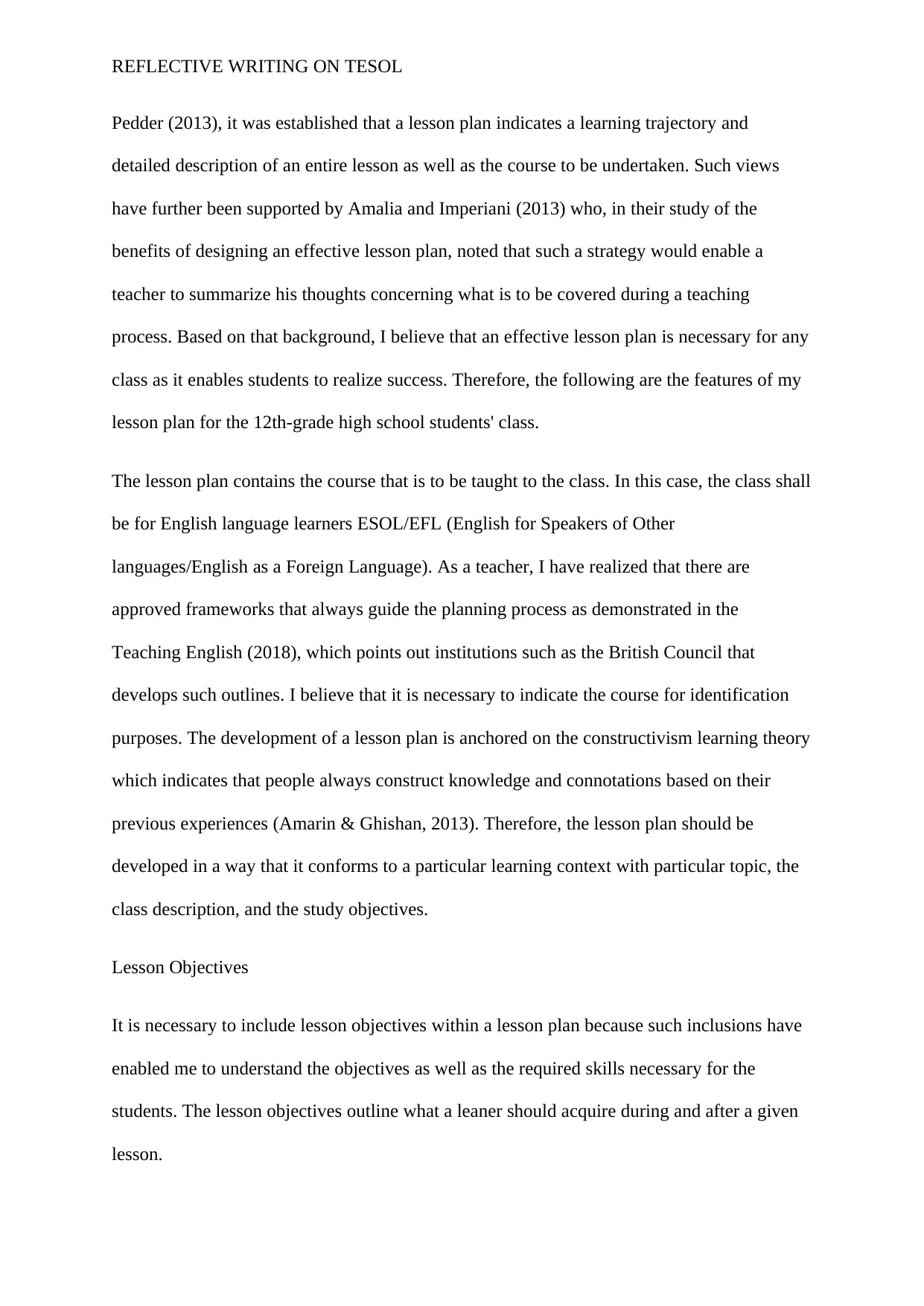
REFLECTIVE WRITING ON TESOL
Pedder (2013), it was established that a lesson plan indicates a learning trajectory and
detailed description of an entire lesson as well as the course to be undertaken. Such views
have further been supported by Amalia and Imperiani (2013) who, in their study of the
benefits of designing an effective lesson plan, noted that such a strategy would enable a
teacher to summarize his thoughts concerning what is to be covered during a teaching
process. Based on that background, I believe that an effective lesson plan is necessary for any
class as it enables students to realize success. Therefore, the following are the features of my
lesson plan for the 12th-grade high school students' class.
The lesson plan contains the course that is to be taught to the class. In this case, the class shall
be for English language learners ESOL/EFL (English for Speakers of Other
languages/English as a Foreign Language). As a teacher, I have realized that there are
approved frameworks that always guide the planning process as demonstrated in the
Teaching English (2018), which points out institutions such as the British Council that
develops such outlines. I believe that it is necessary to indicate the course for identification
purposes. The development of a lesson plan is anchored on the constructivism learning theory
which indicates that people always construct knowledge and connotations based on their
previous experiences (Amarin & Ghishan, 2013). Therefore, the lesson plan should be
developed in a way that it conforms to a particular learning context with particular topic, the
class description, and the study objectives.
Lesson Objectives
It is necessary to include lesson objectives within a lesson plan because such inclusions have
enabled me to understand the objectives as well as the required skills necessary for the
students. The lesson objectives outline what a leaner should acquire during and after a given
lesson.
Pedder (2013), it was established that a lesson plan indicates a learning trajectory and
detailed description of an entire lesson as well as the course to be undertaken. Such views
have further been supported by Amalia and Imperiani (2013) who, in their study of the
benefits of designing an effective lesson plan, noted that such a strategy would enable a
teacher to summarize his thoughts concerning what is to be covered during a teaching
process. Based on that background, I believe that an effective lesson plan is necessary for any
class as it enables students to realize success. Therefore, the following are the features of my
lesson plan for the 12th-grade high school students' class.
The lesson plan contains the course that is to be taught to the class. In this case, the class shall
be for English language learners ESOL/EFL (English for Speakers of Other
languages/English as a Foreign Language). As a teacher, I have realized that there are
approved frameworks that always guide the planning process as demonstrated in the
Teaching English (2018), which points out institutions such as the British Council that
develops such outlines. I believe that it is necessary to indicate the course for identification
purposes. The development of a lesson plan is anchored on the constructivism learning theory
which indicates that people always construct knowledge and connotations based on their
previous experiences (Amarin & Ghishan, 2013). Therefore, the lesson plan should be
developed in a way that it conforms to a particular learning context with particular topic, the
class description, and the study objectives.
Lesson Objectives
It is necessary to include lesson objectives within a lesson plan because such inclusions have
enabled me to understand the objectives as well as the required skills necessary for the
students. The lesson objectives outline what a leaner should acquire during and after a given
lesson.
Paraphrase This Document
Need a fresh take? Get an instant paraphrase of this document with our AI Paraphraser
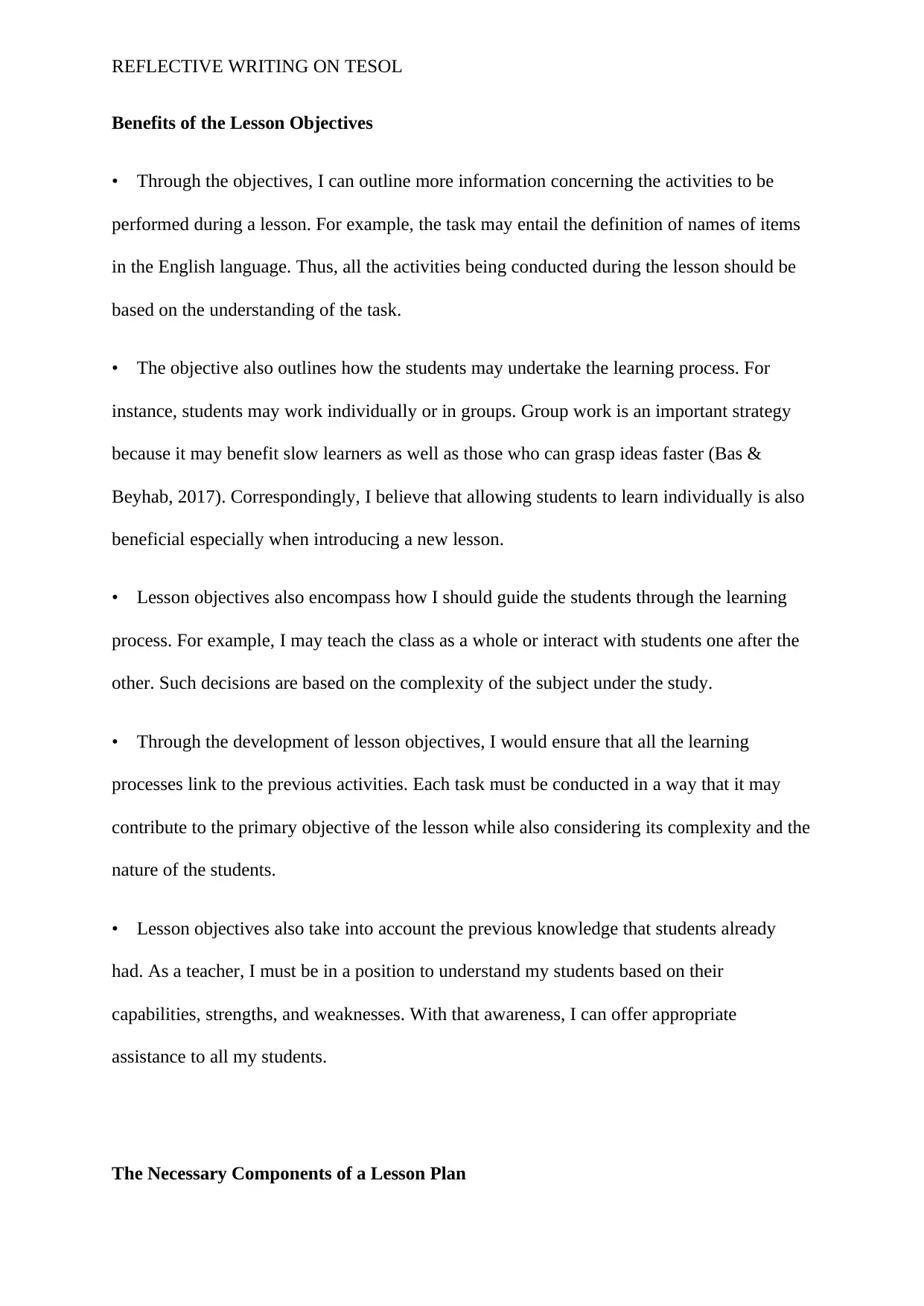
REFLECTIVE WRITING ON TESOL
Benefits of the Lesson Objectives
• Through the objectives, I can outline more information concerning the activities to be
performed during a lesson. For example, the task may entail the definition of names of items
in the English language. Thus, all the activities being conducted during the lesson should be
based on the understanding of the task.
• The objective also outlines how the students may undertake the learning process. For
instance, students may work individually or in groups. Group work is an important strategy
because it may benefit slow learners as well as those who can grasp ideas faster (Bas &
Beyhab, 2017). Correspondingly, I believe that allowing students to learn individually is also
beneficial especially when introducing a new lesson.
• Lesson objectives also encompass how I should guide the students through the learning
process. For example, I may teach the class as a whole or interact with students one after the
other. Such decisions are based on the complexity of the subject under the study.
• Through the development of lesson objectives, I would ensure that all the learning
processes link to the previous activities. Each task must be conducted in a way that it may
contribute to the primary objective of the lesson while also considering its complexity and the
nature of the students.
• Lesson objectives also take into account the previous knowledge that students already
had. As a teacher, I must be in a position to understand my students based on their
capabilities, strengths, and weaknesses. With that awareness, I can offer appropriate
assistance to all my students.
The Necessary Components of a Lesson Plan
Benefits of the Lesson Objectives
• Through the objectives, I can outline more information concerning the activities to be
performed during a lesson. For example, the task may entail the definition of names of items
in the English language. Thus, all the activities being conducted during the lesson should be
based on the understanding of the task.
• The objective also outlines how the students may undertake the learning process. For
instance, students may work individually or in groups. Group work is an important strategy
because it may benefit slow learners as well as those who can grasp ideas faster (Bas &
Beyhab, 2017). Correspondingly, I believe that allowing students to learn individually is also
beneficial especially when introducing a new lesson.
• Lesson objectives also encompass how I should guide the students through the learning
process. For example, I may teach the class as a whole or interact with students one after the
other. Such decisions are based on the complexity of the subject under the study.
• Through the development of lesson objectives, I would ensure that all the learning
processes link to the previous activities. Each task must be conducted in a way that it may
contribute to the primary objective of the lesson while also considering its complexity and the
nature of the students.
• Lesson objectives also take into account the previous knowledge that students already
had. As a teacher, I must be in a position to understand my students based on their
capabilities, strengths, and weaknesses. With that awareness, I can offer appropriate
assistance to all my students.
The Necessary Components of a Lesson Plan
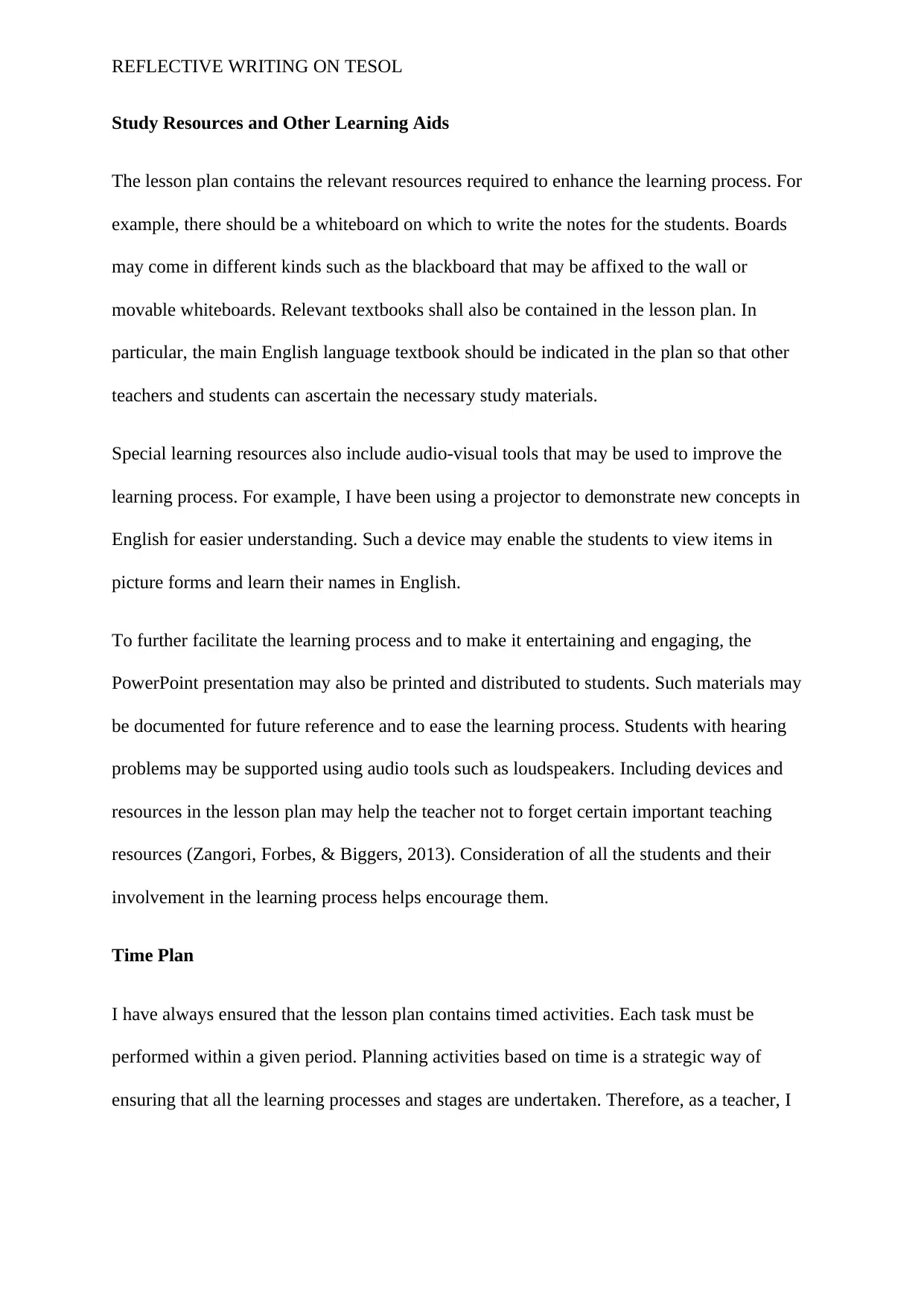
REFLECTIVE WRITING ON TESOL
Study Resources and Other Learning Aids
The lesson plan contains the relevant resources required to enhance the learning process. For
example, there should be a whiteboard on which to write the notes for the students. Boards
may come in different kinds such as the blackboard that may be affixed to the wall or
movable whiteboards. Relevant textbooks shall also be contained in the lesson plan. In
particular, the main English language textbook should be indicated in the plan so that other
teachers and students can ascertain the necessary study materials.
Special learning resources also include audio-visual tools that may be used to improve the
learning process. For example, I have been using a projector to demonstrate new concepts in
English for easier understanding. Such a device may enable the students to view items in
picture forms and learn their names in English.
To further facilitate the learning process and to make it entertaining and engaging, the
PowerPoint presentation may also be printed and distributed to students. Such materials may
be documented for future reference and to ease the learning process. Students with hearing
problems may be supported using audio tools such as loudspeakers. Including devices and
resources in the lesson plan may help the teacher not to forget certain important teaching
resources (Zangori, Forbes, & Biggers, 2013). Consideration of all the students and their
involvement in the learning process helps encourage them.
Time Plan
I have always ensured that the lesson plan contains timed activities. Each task must be
performed within a given period. Planning activities based on time is a strategic way of
ensuring that all the learning processes and stages are undertaken. Therefore, as a teacher, I
Study Resources and Other Learning Aids
The lesson plan contains the relevant resources required to enhance the learning process. For
example, there should be a whiteboard on which to write the notes for the students. Boards
may come in different kinds such as the blackboard that may be affixed to the wall or
movable whiteboards. Relevant textbooks shall also be contained in the lesson plan. In
particular, the main English language textbook should be indicated in the plan so that other
teachers and students can ascertain the necessary study materials.
Special learning resources also include audio-visual tools that may be used to improve the
learning process. For example, I have been using a projector to demonstrate new concepts in
English for easier understanding. Such a device may enable the students to view items in
picture forms and learn their names in English.
To further facilitate the learning process and to make it entertaining and engaging, the
PowerPoint presentation may also be printed and distributed to students. Such materials may
be documented for future reference and to ease the learning process. Students with hearing
problems may be supported using audio tools such as loudspeakers. Including devices and
resources in the lesson plan may help the teacher not to forget certain important teaching
resources (Zangori, Forbes, & Biggers, 2013). Consideration of all the students and their
involvement in the learning process helps encourage them.
Time Plan
I have always ensured that the lesson plan contains timed activities. Each task must be
performed within a given period. Planning activities based on time is a strategic way of
ensuring that all the learning processes and stages are undertaken. Therefore, as a teacher, I
⊘ This is a preview!⊘
Do you want full access?
Subscribe today to unlock all pages.

Trusted by 1+ million students worldwide
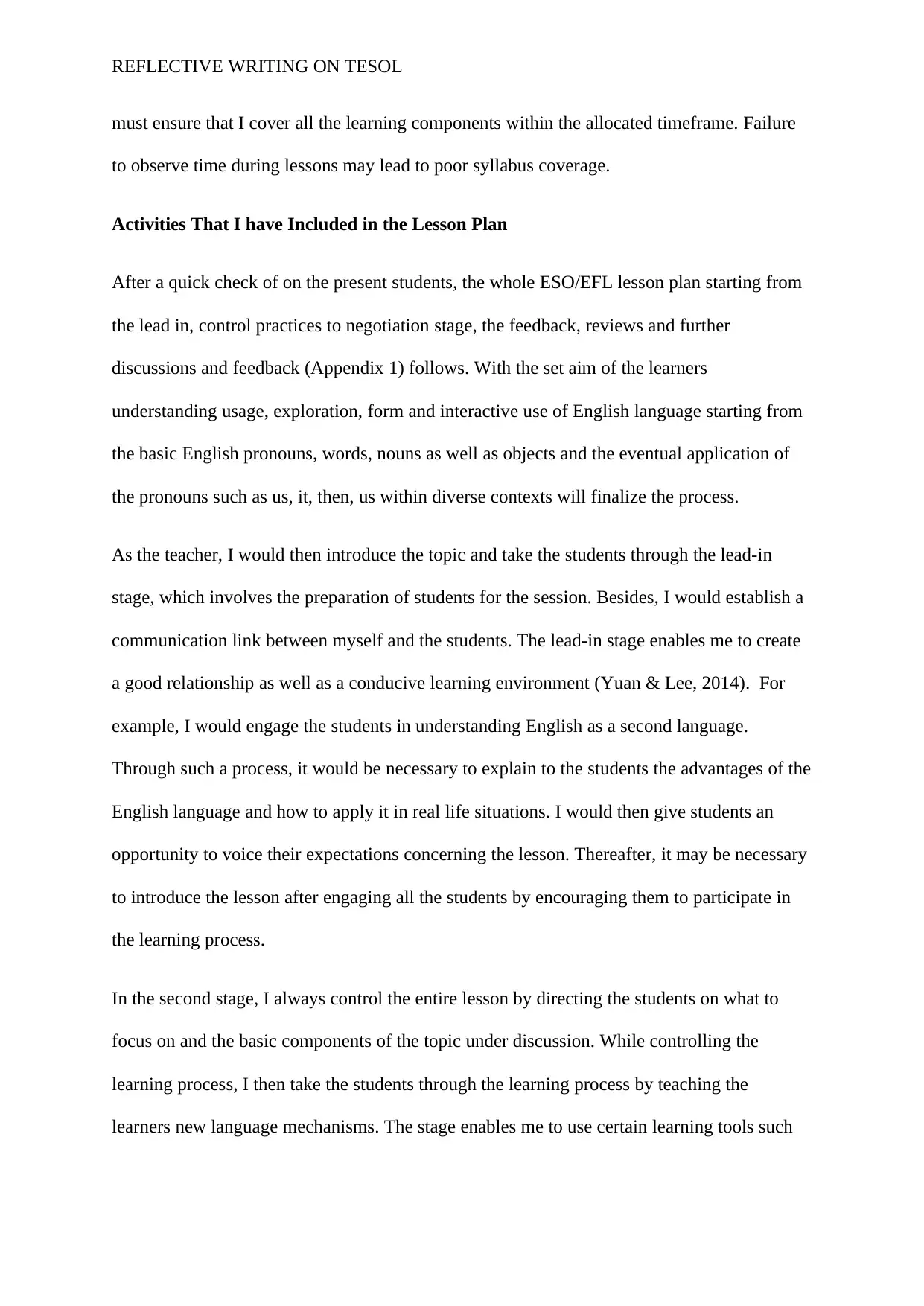
REFLECTIVE WRITING ON TESOL
must ensure that I cover all the learning components within the allocated timeframe. Failure
to observe time during lessons may lead to poor syllabus coverage.
Activities That I have Included in the Lesson Plan
After a quick check of on the present students, the whole ESO/EFL lesson plan starting from
the lead in, control practices to negotiation stage, the feedback, reviews and further
discussions and feedback (Appendix 1) follows. With the set aim of the learners
understanding usage, exploration, form and interactive use of English language starting from
the basic English pronouns, words, nouns as well as objects and the eventual application of
the pronouns such as us, it, then, us within diverse contexts will finalize the process.
As the teacher, I would then introduce the topic and take the students through the lead-in
stage, which involves the preparation of students for the session. Besides, I would establish a
communication link between myself and the students. The lead-in stage enables me to create
a good relationship as well as a conducive learning environment (Yuan & Lee, 2014). For
example, I would engage the students in understanding English as a second language.
Through such a process, it would be necessary to explain to the students the advantages of the
English language and how to apply it in real life situations. I would then give students an
opportunity to voice their expectations concerning the lesson. Thereafter, it may be necessary
to introduce the lesson after engaging all the students by encouraging them to participate in
the learning process.
In the second stage, I always control the entire lesson by directing the students on what to
focus on and the basic components of the topic under discussion. While controlling the
learning process, I then take the students through the learning process by teaching the
learners new language mechanisms. The stage enables me to use certain learning tools such
must ensure that I cover all the learning components within the allocated timeframe. Failure
to observe time during lessons may lead to poor syllabus coverage.
Activities That I have Included in the Lesson Plan
After a quick check of on the present students, the whole ESO/EFL lesson plan starting from
the lead in, control practices to negotiation stage, the feedback, reviews and further
discussions and feedback (Appendix 1) follows. With the set aim of the learners
understanding usage, exploration, form and interactive use of English language starting from
the basic English pronouns, words, nouns as well as objects and the eventual application of
the pronouns such as us, it, then, us within diverse contexts will finalize the process.
As the teacher, I would then introduce the topic and take the students through the lead-in
stage, which involves the preparation of students for the session. Besides, I would establish a
communication link between myself and the students. The lead-in stage enables me to create
a good relationship as well as a conducive learning environment (Yuan & Lee, 2014). For
example, I would engage the students in understanding English as a second language.
Through such a process, it would be necessary to explain to the students the advantages of the
English language and how to apply it in real life situations. I would then give students an
opportunity to voice their expectations concerning the lesson. Thereafter, it may be necessary
to introduce the lesson after engaging all the students by encouraging them to participate in
the learning process.
In the second stage, I always control the entire lesson by directing the students on what to
focus on and the basic components of the topic under discussion. While controlling the
learning process, I then take the students through the learning process by teaching the
learners new language mechanisms. The stage enables me to use certain learning tools such
Paraphrase This Document
Need a fresh take? Get an instant paraphrase of this document with our AI Paraphraser
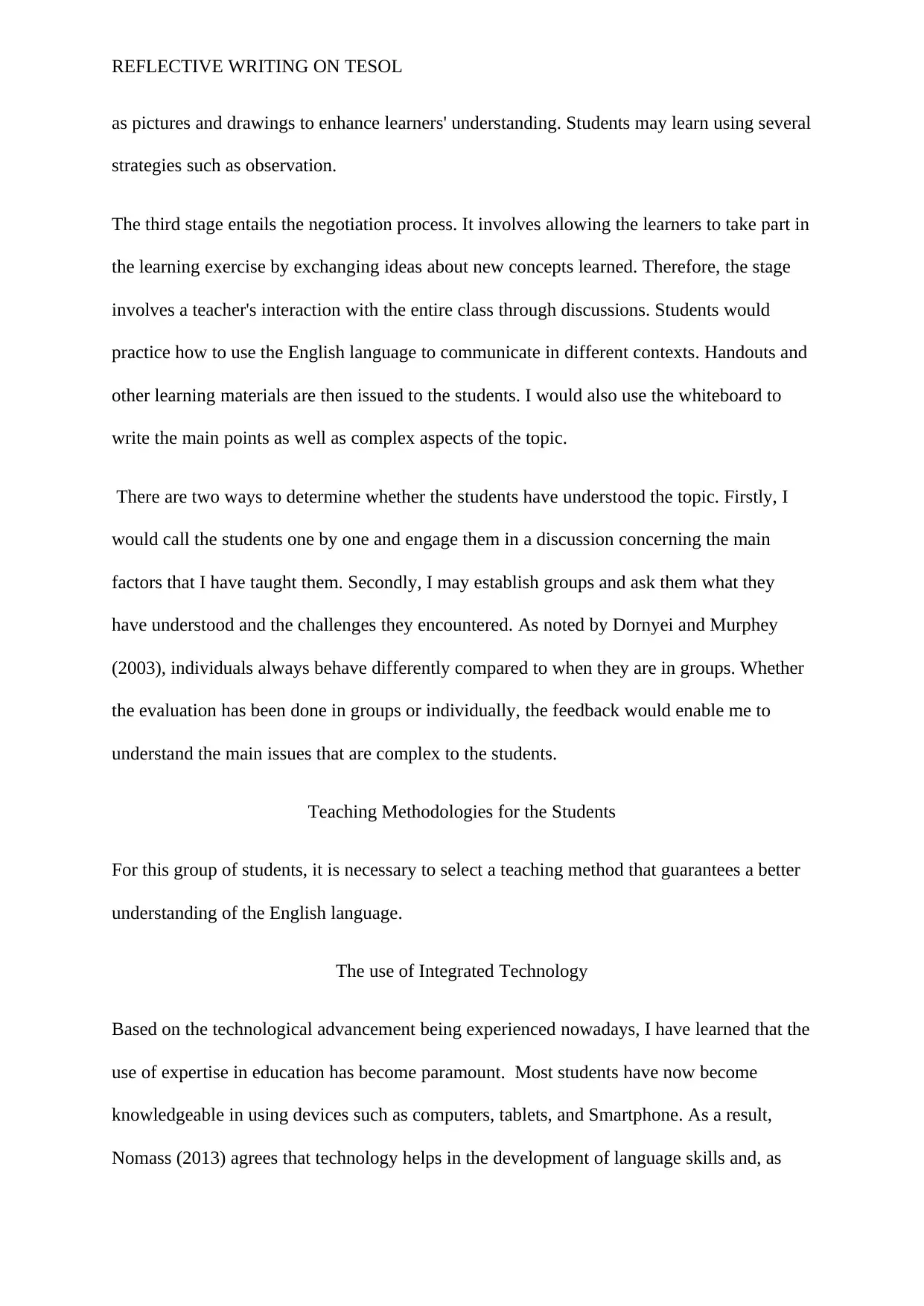
REFLECTIVE WRITING ON TESOL
as pictures and drawings to enhance learners' understanding. Students may learn using several
strategies such as observation.
The third stage entails the negotiation process. It involves allowing the learners to take part in
the learning exercise by exchanging ideas about new concepts learned. Therefore, the stage
involves a teacher's interaction with the entire class through discussions. Students would
practice how to use the English language to communicate in different contexts. Handouts and
other learning materials are then issued to the students. I would also use the whiteboard to
write the main points as well as complex aspects of the topic.
There are two ways to determine whether the students have understood the topic. Firstly, I
would call the students one by one and engage them in a discussion concerning the main
factors that I have taught them. Secondly, I may establish groups and ask them what they
have understood and the challenges they encountered. As noted by Dornyei and Murphey
(2003), individuals always behave differently compared to when they are in groups. Whether
the evaluation has been done in groups or individually, the feedback would enable me to
understand the main issues that are complex to the students.
Teaching Methodologies for the Students
For this group of students, it is necessary to select a teaching method that guarantees a better
understanding of the English language.
The use of Integrated Technology
Based on the technological advancement being experienced nowadays, I have learned that the
use of expertise in education has become paramount. Most students have now become
knowledgeable in using devices such as computers, tablets, and Smartphone. As a result,
Nomass (2013) agrees that technology helps in the development of language skills and, as
as pictures and drawings to enhance learners' understanding. Students may learn using several
strategies such as observation.
The third stage entails the negotiation process. It involves allowing the learners to take part in
the learning exercise by exchanging ideas about new concepts learned. Therefore, the stage
involves a teacher's interaction with the entire class through discussions. Students would
practice how to use the English language to communicate in different contexts. Handouts and
other learning materials are then issued to the students. I would also use the whiteboard to
write the main points as well as complex aspects of the topic.
There are two ways to determine whether the students have understood the topic. Firstly, I
would call the students one by one and engage them in a discussion concerning the main
factors that I have taught them. Secondly, I may establish groups and ask them what they
have understood and the challenges they encountered. As noted by Dornyei and Murphey
(2003), individuals always behave differently compared to when they are in groups. Whether
the evaluation has been done in groups or individually, the feedback would enable me to
understand the main issues that are complex to the students.
Teaching Methodologies for the Students
For this group of students, it is necessary to select a teaching method that guarantees a better
understanding of the English language.
The use of Integrated Technology
Based on the technological advancement being experienced nowadays, I have learned that the
use of expertise in education has become paramount. Most students have now become
knowledgeable in using devices such as computers, tablets, and Smartphone. As a result,
Nomass (2013) agrees that technology helps in the development of language skills and, as
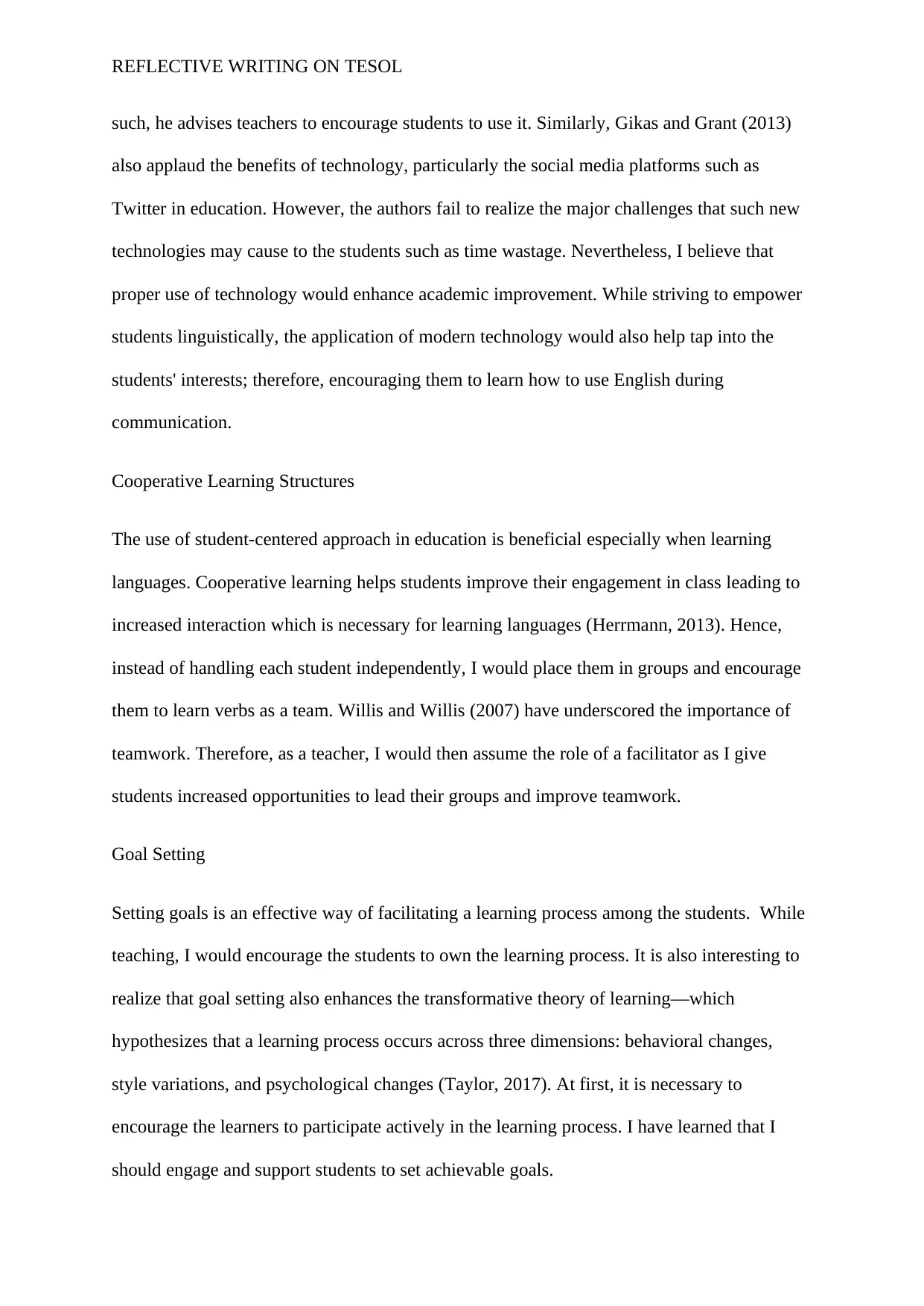
REFLECTIVE WRITING ON TESOL
such, he advises teachers to encourage students to use it. Similarly, Gikas and Grant (2013)
also applaud the benefits of technology, particularly the social media platforms such as
Twitter in education. However, the authors fail to realize the major challenges that such new
technologies may cause to the students such as time wastage. Nevertheless, I believe that
proper use of technology would enhance academic improvement. While striving to empower
students linguistically, the application of modern technology would also help tap into the
students' interests; therefore, encouraging them to learn how to use English during
communication.
Cooperative Learning Structures
The use of student-centered approach in education is beneficial especially when learning
languages. Cooperative learning helps students improve their engagement in class leading to
increased interaction which is necessary for learning languages (Herrmann, 2013). Hence,
instead of handling each student independently, I would place them in groups and encourage
them to learn verbs as a team. Willis and Willis (2007) have underscored the importance of
teamwork. Therefore, as a teacher, I would then assume the role of a facilitator as I give
students increased opportunities to lead their groups and improve teamwork.
Goal Setting
Setting goals is an effective way of facilitating a learning process among the students. While
teaching, I would encourage the students to own the learning process. It is also interesting to
realize that goal setting also enhances the transformative theory of learning—which
hypothesizes that a learning process occurs across three dimensions: behavioral changes,
style variations, and psychological changes (Taylor, 2017). At first, it is necessary to
encourage the learners to participate actively in the learning process. I have learned that I
should engage and support students to set achievable goals.
such, he advises teachers to encourage students to use it. Similarly, Gikas and Grant (2013)
also applaud the benefits of technology, particularly the social media platforms such as
Twitter in education. However, the authors fail to realize the major challenges that such new
technologies may cause to the students such as time wastage. Nevertheless, I believe that
proper use of technology would enhance academic improvement. While striving to empower
students linguistically, the application of modern technology would also help tap into the
students' interests; therefore, encouraging them to learn how to use English during
communication.
Cooperative Learning Structures
The use of student-centered approach in education is beneficial especially when learning
languages. Cooperative learning helps students improve their engagement in class leading to
increased interaction which is necessary for learning languages (Herrmann, 2013). Hence,
instead of handling each student independently, I would place them in groups and encourage
them to learn verbs as a team. Willis and Willis (2007) have underscored the importance of
teamwork. Therefore, as a teacher, I would then assume the role of a facilitator as I give
students increased opportunities to lead their groups and improve teamwork.
Goal Setting
Setting goals is an effective way of facilitating a learning process among the students. While
teaching, I would encourage the students to own the learning process. It is also interesting to
realize that goal setting also enhances the transformative theory of learning—which
hypothesizes that a learning process occurs across three dimensions: behavioral changes,
style variations, and psychological changes (Taylor, 2017). At first, it is necessary to
encourage the learners to participate actively in the learning process. I have learned that I
should engage and support students to set achievable goals.
⊘ This is a preview!⊘
Do you want full access?
Subscribe today to unlock all pages.

Trusted by 1+ million students worldwide
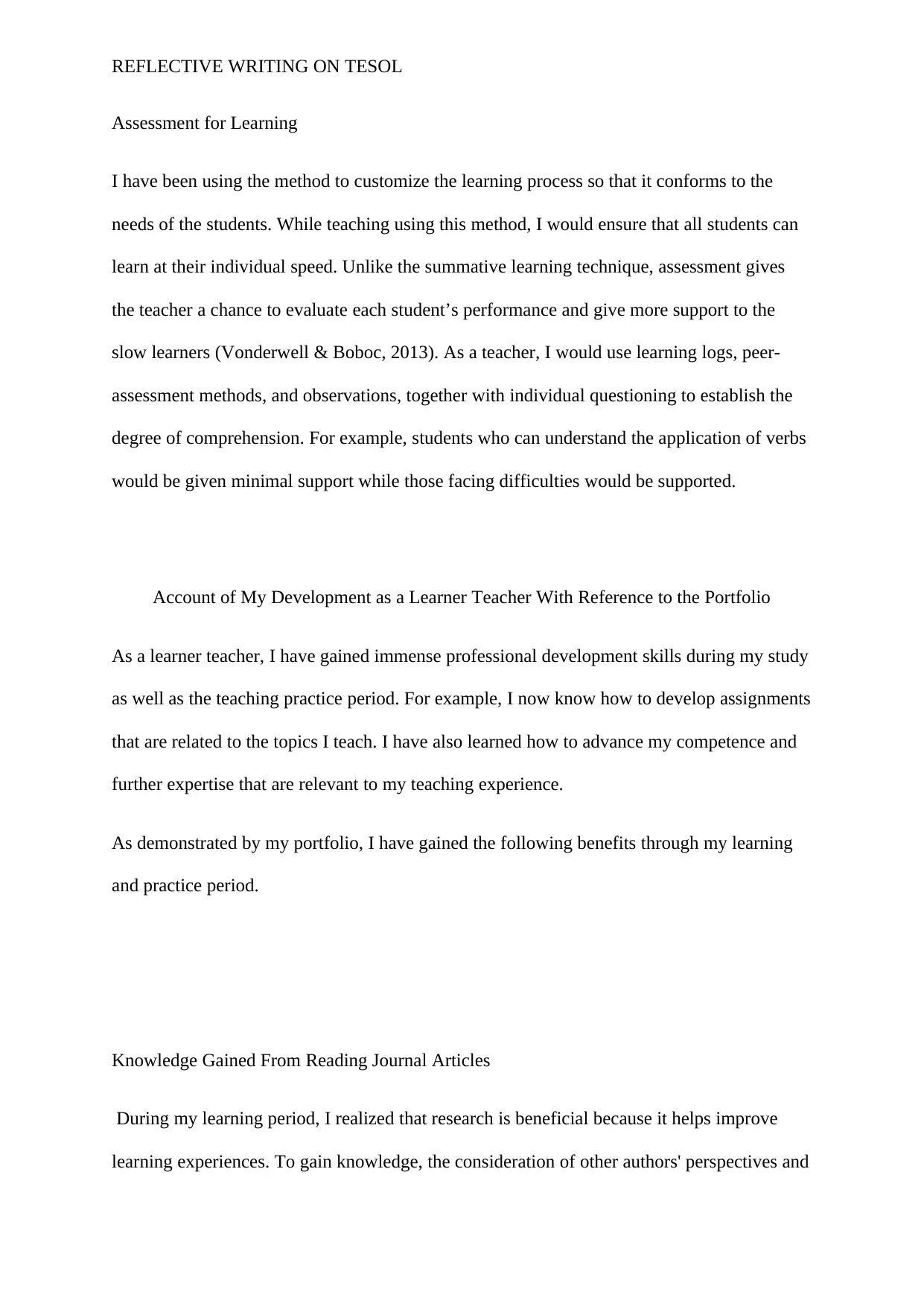
REFLECTIVE WRITING ON TESOL
Assessment for Learning
I have been using the method to customize the learning process so that it conforms to the
needs of the students. While teaching using this method, I would ensure that all students can
learn at their individual speed. Unlike the summative learning technique, assessment gives
the teacher a chance to evaluate each student’s performance and give more support to the
slow learners (Vonderwell & Boboc, 2013). As a teacher, I would use learning logs, peer-
assessment methods, and observations, together with individual questioning to establish the
degree of comprehension. For example, students who can understand the application of verbs
would be given minimal support while those facing difficulties would be supported.
Account of My Development as a Learner Teacher With Reference to the Portfolio
As a learner teacher, I have gained immense professional development skills during my study
as well as the teaching practice period. For example, I now know how to develop assignments
that are related to the topics I teach. I have also learned how to advance my competence and
further expertise that are relevant to my teaching experience.
As demonstrated by my portfolio, I have gained the following benefits through my learning
and practice period.
Knowledge Gained From Reading Journal Articles
During my learning period, I realized that research is beneficial because it helps improve
learning experiences. To gain knowledge, the consideration of other authors' perspectives and
Assessment for Learning
I have been using the method to customize the learning process so that it conforms to the
needs of the students. While teaching using this method, I would ensure that all students can
learn at their individual speed. Unlike the summative learning technique, assessment gives
the teacher a chance to evaluate each student’s performance and give more support to the
slow learners (Vonderwell & Boboc, 2013). As a teacher, I would use learning logs, peer-
assessment methods, and observations, together with individual questioning to establish the
degree of comprehension. For example, students who can understand the application of verbs
would be given minimal support while those facing difficulties would be supported.
Account of My Development as a Learner Teacher With Reference to the Portfolio
As a learner teacher, I have gained immense professional development skills during my study
as well as the teaching practice period. For example, I now know how to develop assignments
that are related to the topics I teach. I have also learned how to advance my competence and
further expertise that are relevant to my teaching experience.
As demonstrated by my portfolio, I have gained the following benefits through my learning
and practice period.
Knowledge Gained From Reading Journal Articles
During my learning period, I realized that research is beneficial because it helps improve
learning experiences. To gain knowledge, the consideration of other authors' perspectives and
Paraphrase This Document
Need a fresh take? Get an instant paraphrase of this document with our AI Paraphraser
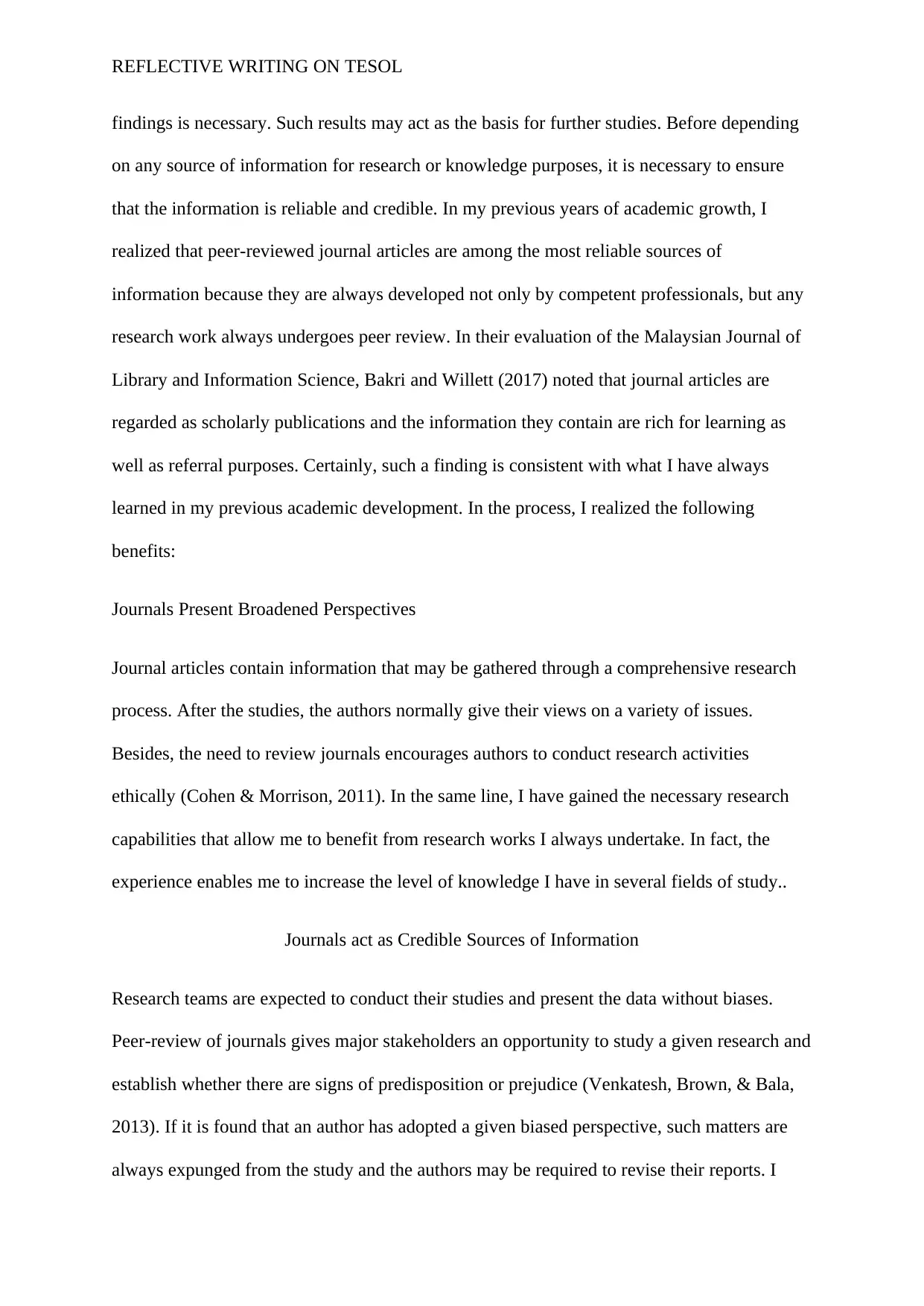
REFLECTIVE WRITING ON TESOL
findings is necessary. Such results may act as the basis for further studies. Before depending
on any source of information for research or knowledge purposes, it is necessary to ensure
that the information is reliable and credible. In my previous years of academic growth, I
realized that peer-reviewed journal articles are among the most reliable sources of
information because they are always developed not only by competent professionals, but any
research work always undergoes peer review. In their evaluation of the Malaysian Journal of
Library and Information Science, Bakri and Willett (2017) noted that journal articles are
regarded as scholarly publications and the information they contain are rich for learning as
well as referral purposes. Certainly, such a finding is consistent with what I have always
learned in my previous academic development. In the process, I realized the following
benefits:
Journals Present Broadened Perspectives
Journal articles contain information that may be gathered through a comprehensive research
process. After the studies, the authors normally give their views on a variety of issues.
Besides, the need to review journals encourages authors to conduct research activities
ethically (Cohen & Morrison, 2011). In the same line, I have gained the necessary research
capabilities that allow me to benefit from research works I always undertake. In fact, the
experience enables me to increase the level of knowledge I have in several fields of study..
Journals act as Credible Sources of Information
Research teams are expected to conduct their studies and present the data without biases.
Peer-review of journals gives major stakeholders an opportunity to study a given research and
establish whether there are signs of predisposition or prejudice (Venkatesh, Brown, & Bala,
2013). If it is found that an author has adopted a given biased perspective, such matters are
always expunged from the study and the authors may be required to revise their reports. I
findings is necessary. Such results may act as the basis for further studies. Before depending
on any source of information for research or knowledge purposes, it is necessary to ensure
that the information is reliable and credible. In my previous years of academic growth, I
realized that peer-reviewed journal articles are among the most reliable sources of
information because they are always developed not only by competent professionals, but any
research work always undergoes peer review. In their evaluation of the Malaysian Journal of
Library and Information Science, Bakri and Willett (2017) noted that journal articles are
regarded as scholarly publications and the information they contain are rich for learning as
well as referral purposes. Certainly, such a finding is consistent with what I have always
learned in my previous academic development. In the process, I realized the following
benefits:
Journals Present Broadened Perspectives
Journal articles contain information that may be gathered through a comprehensive research
process. After the studies, the authors normally give their views on a variety of issues.
Besides, the need to review journals encourages authors to conduct research activities
ethically (Cohen & Morrison, 2011). In the same line, I have gained the necessary research
capabilities that allow me to benefit from research works I always undertake. In fact, the
experience enables me to increase the level of knowledge I have in several fields of study..
Journals act as Credible Sources of Information
Research teams are expected to conduct their studies and present the data without biases.
Peer-review of journals gives major stakeholders an opportunity to study a given research and
establish whether there are signs of predisposition or prejudice (Venkatesh, Brown, & Bala,
2013). If it is found that an author has adopted a given biased perspective, such matters are
always expunged from the study and the authors may be required to revise their reports. I
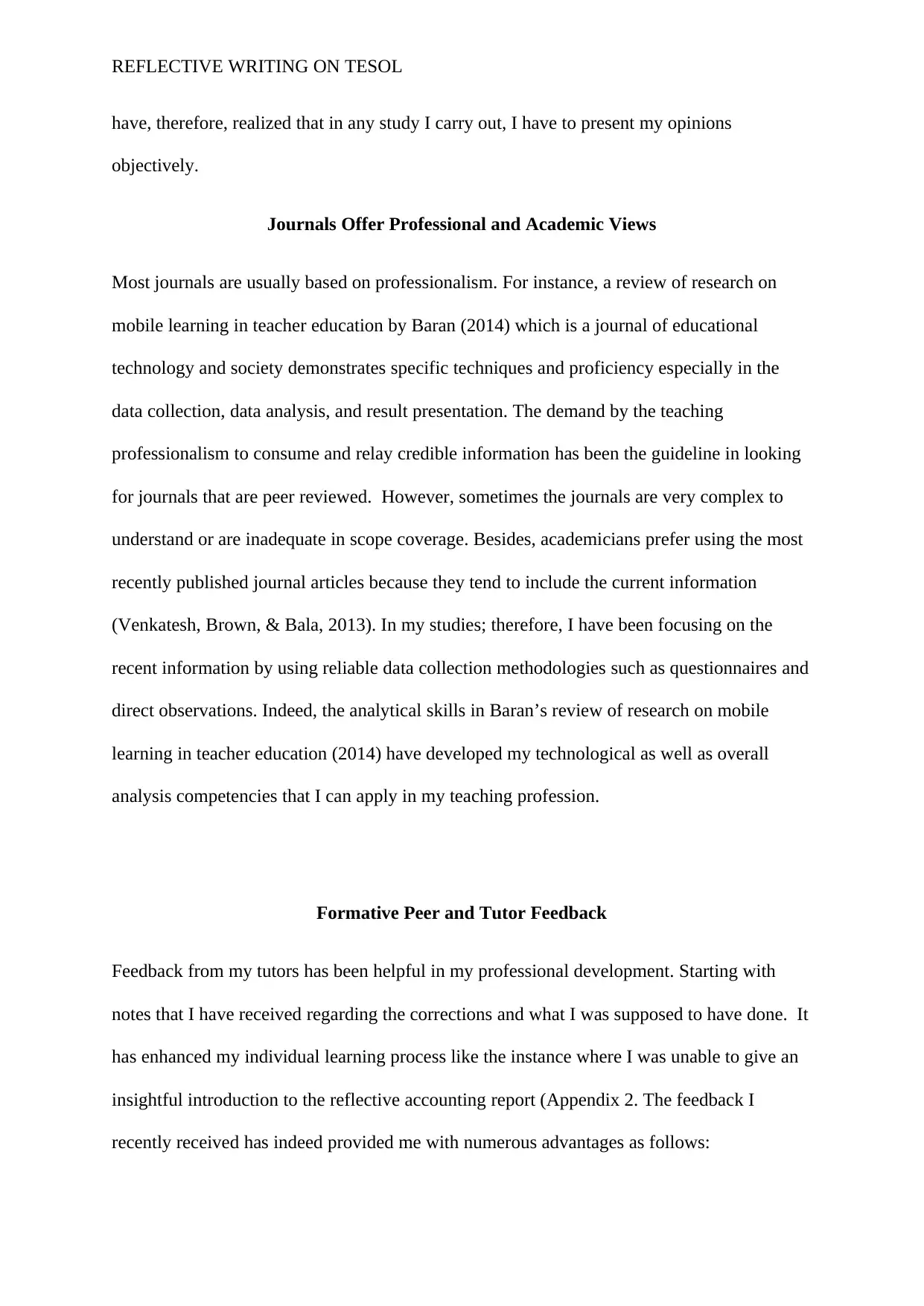
REFLECTIVE WRITING ON TESOL
have, therefore, realized that in any study I carry out, I have to present my opinions
objectively.
Journals Offer Professional and Academic Views
Most journals are usually based on professionalism. For instance, a review of research on
mobile learning in teacher education by Baran (2014) which is a journal of educational
technology and society demonstrates specific techniques and proficiency especially in the
data collection, data analysis, and result presentation. The demand by the teaching
professionalism to consume and relay credible information has been the guideline in looking
for journals that are peer reviewed. However, sometimes the journals are very complex to
understand or are inadequate in scope coverage. Besides, academicians prefer using the most
recently published journal articles because they tend to include the current information
(Venkatesh, Brown, & Bala, 2013). In my studies; therefore, I have been focusing on the
recent information by using reliable data collection methodologies such as questionnaires and
direct observations. Indeed, the analytical skills in Baran’s review of research on mobile
learning in teacher education (2014) have developed my technological as well as overall
analysis competencies that I can apply in my teaching profession.
Formative Peer and Tutor Feedback
Feedback from my tutors has been helpful in my professional development. Starting with
notes that I have received regarding the corrections and what I was supposed to have done. It
has enhanced my individual learning process like the instance where I was unable to give an
insightful introduction to the reflective accounting report (Appendix 2. The feedback I
recently received has indeed provided me with numerous advantages as follows:
have, therefore, realized that in any study I carry out, I have to present my opinions
objectively.
Journals Offer Professional and Academic Views
Most journals are usually based on professionalism. For instance, a review of research on
mobile learning in teacher education by Baran (2014) which is a journal of educational
technology and society demonstrates specific techniques and proficiency especially in the
data collection, data analysis, and result presentation. The demand by the teaching
professionalism to consume and relay credible information has been the guideline in looking
for journals that are peer reviewed. However, sometimes the journals are very complex to
understand or are inadequate in scope coverage. Besides, academicians prefer using the most
recently published journal articles because they tend to include the current information
(Venkatesh, Brown, & Bala, 2013). In my studies; therefore, I have been focusing on the
recent information by using reliable data collection methodologies such as questionnaires and
direct observations. Indeed, the analytical skills in Baran’s review of research on mobile
learning in teacher education (2014) have developed my technological as well as overall
analysis competencies that I can apply in my teaching profession.
Formative Peer and Tutor Feedback
Feedback from my tutors has been helpful in my professional development. Starting with
notes that I have received regarding the corrections and what I was supposed to have done. It
has enhanced my individual learning process like the instance where I was unable to give an
insightful introduction to the reflective accounting report (Appendix 2. The feedback I
recently received has indeed provided me with numerous advantages as follows:
⊘ This is a preview!⊘
Do you want full access?
Subscribe today to unlock all pages.

Trusted by 1+ million students worldwide
1 out of 38
Related Documents
Your All-in-One AI-Powered Toolkit for Academic Success.
+13062052269
info@desklib.com
Available 24*7 on WhatsApp / Email
![[object Object]](/_next/static/media/star-bottom.7253800d.svg)
Unlock your academic potential
Copyright © 2020–2026 A2Z Services. All Rights Reserved. Developed and managed by ZUCOL.





